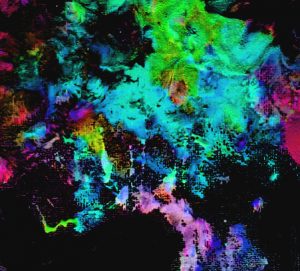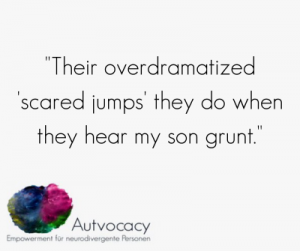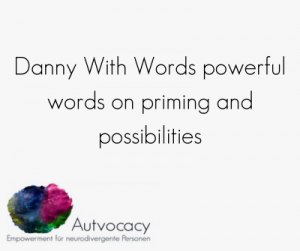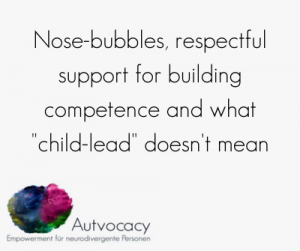Nose-bubbles, respectful support for building competence and what “child-lead” doesn’t mean
This was originally a social media response response/addition to a this beautiful post by my friend and neurokin The Peaceful Swim Teacher that merges with things I’ve been wanting to express. Both posts questions adults’ fear-based ideas around how children build competence.
Alex is an exceptionally skilled, childism-informed and respectful swim teacher and swimmer, and she writes about the possibilities that sharing her competences and joy for swimming and aquatic skill building creates for similarly interested young persons.
Her professional competences as a swimmer and swim trainer merge in a unique way with her insight into how children actually learn, without coersion, manipulation, fear, distrust or timelines.
With an understanding of barriers and of how harmful it is to transfer a distrust onto young persons of their own impulses, resistances, joys and thoughts.
The Peaceful Swim Teacher school will surely sthrive because it will help others thrive beautifully, with so much joy and safety.
Alex’s work also lays open the kinds of violence, harms and barriers that many (most) services and offers contain. She shows that we can support children (and other persons) more effeciently, more lovingly, and respectfully, with better all around results.
As Alex says, when parents/caretakers do lack the kind of aquatic competencies Alex has – or comparable competencies in other areas – there very often aren’t similarly safe and respectful persons to pay to step in and cover that part.
This relates to athletic skills, to artistic skills, to sensory processing support needs, communication support needs, movement and motor support needs, etc.
Our children very often end up needing safe, respectful, skillful support in areas where we aren’t as competent.
So “it takes a village”, right? We delegate. We find others to support them. Right?
This is what I want to add to this conversation:
The intersection of ableism and neuronormativity with childism/adultism (and sometimes racism, cisheteronormativity, etc.) means:
many autistic young persons, PDAers, young persons with attention differences/”AD(H)D”, dyspraxia, apraxia etc., there often isn’t a safe village.
This is what exclusion means.
So a young, neurodivergent persons might love water.
And their parents might not have the kinds of aquatic skills that Alex has.
Parents might look around for the kindest, most safety-and neurodiversity informed, most inclusive and respectful person around.
But very often, the message of “it takes a village” ends up leading to parents, caretakers etc. choosing the least harmful person to step in – or give swim lessons, in this case, not always because they think they can mitigate the harms, but because they are told anything else would be neglectful.
Choosing the least harmful option while having build up skills to recognise and counter-balance the harm and barriers may be a valid option. This is not a post to criticise parent’s choices.
This is a post to open up space for honoring discomfort, resistance, unease. And for acknowledging that saying “no”, that “opting” for no support, can be a valid, safety-informed option. This is a call for us to open up space to sit with this discomfort and to support parents, one another, through them. And to cut through some more gaslighting.
There are very few people out there who understand how to support young persons with divergent sensory and motor processes competently and gently.
And there are even less people out there who understand how to offer young PDAers support in building on skills without ignoring intense experiences of demand avoidance, of performance anxiety, of struggling with imperfection, without encroaching on young person’s sense of autonomy.
So sometimes, truly understanding the unseen barriers in the “offers” around us can mean that parents and care-takers “choose” (not that it’s much of a choice) not to have someone lacking crucial insight, information and experience step in.
I have struggled with this “choice” myself in the past because of this aspect, so I’d like to write it out:
There often seems to be a suggestion that one SHOULD be able to find safe outside support if they look hard enough; So it’s kind of people’s own fault if they think this kind of support doesn’t exist. I see many parents struggle with this.
**Parent-blame by professionals exacerbates this suggestion in that parents of neurodivergent children with a better understanding of barriers are regularly accused of projecting unbased fears onto their children and endangering their progress.
There is gaslighting and erasure of barriers and harms contained in this.
I think, when it comes to neurodivergent young persons, a very basic neurodivergence-affirming thing to acknowledge is:
Too many people misunderstand just how harmful the impact of ableism and childism is on young neurodivergent persons.
Too many “offers” and services out there are not build on this critical knowledge.
So, parents and caretakers end up “choosing” against additional support, not because they think it’s not actually needed, but because they understand that options around them carry too much potential for unrecognised harm.
I think this is terrible. But also powerful. It doesn’t reflect personal failings, it reflects understanding the impacts of societal failings.
I see advocates defending keeping our kids inside, sometimes isolated, withdrawn, with unmet movement needs, adventure needs, connection needs. What’s often missed is:
This is not because young neurodivergent persons don’t have other needs, it’s because in many environments, withdrawal is a consequence of trauma, and parents/caretakers supporting it is a consequence of acknowledging the lack of safe options.
These societal failings are not something acceptable to sit with. They can lead to a very real lack of choices. So let’s acknowledge that.
When there aren’t truly skilled, neurodivernce-affirming professionals and friends around like my friend, The Peaceful Swim Teacher, sometimes the best way to support a young persons aquatic joy and competence building is to have aquatically-a-lot-less-competent family members just regularly make joined aquatic joy, accessible pools, lakes and water bodies, regularly available together.
While this might lead to less ackomplished techniques and body concepts, while some needs will stay unmet, this prioritises safety, autonomoy, trust, joy and safeguarding trust in one’s own learning processes. This is not only powerful and fosters important life skills for us.
It will also enable effective skill-building when safe options arise in the future or will lead to young persons being less vulnerable, when ableism and childism will be a bit less harmful to them, at a given time in the future, when that they can more confidently identify harms and better navigate unsafe options.
Sometimes not exposing young persons to support options because the available ones are unsafe can be a powerful, loving, acknowledging and trustful skill-building support. For now.
Neurodivergent scheduling
Neuronormative scheduling can set us up for failure – but what are the alternatives? Dear neurokin, when scheduling an appointment or a social engagement and someone proposes a specific…
A response to Peter Gray: children who seem to direct play aren’t tyrants – about harmful narratives that marginalise neurodivergent play
I’d like to share my thoughts on a specific part of this post by advocate and researcher Peter Gray. It’s a post where Peter Gray, whose work on play and…
Book Discussion of „A Day with No Words“ by Tiffany Hammond (long version)
*See here for a shorter version. Today is the day: The children’s book „A Day With No Words” by autistic author Tiffany Hammond is officially out. Today is also the…
Book Review of A Day With No Words by Tiffany Hammond
Short Version **For a longer discussion of this book, see here. A Day with No Words, by Tiffany Hammond is beautifully written, lovingly illustrated by Kate Cosgrove, and fills parts…
“Their overdramatized ‘scared jumps’ they do when they hear my son grunt.”
This is from a social media response to this important post by Fidgets and Fries whose online work I highly recommend. If you are on Substrack or Patreon, this is…
Danny With Words powerful words on priming and possibilities
If you aren’t already, I cannot recommend following Danny With Words enough. This post is a social media response to Danny’s list about the kinds of preparation and priming that…
Nose-bubbles, respectful support for building competence and what “child-lead” doesn’t mean
This was originally a social media response response/addition to a this beautiful post by my friend and neurokin The Peaceful Swim Teacher that merges with things I’ve been wanting to…





